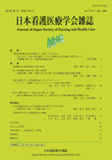Japanese
English
- 有料閲覧
- Abstract 文献概要
- 参考文献 Reference
和文抄録
本研究の目的は、思春期にある喘息児の服薬コンプライアンスの状況把握と、日本語版Asthma Compliance Instrument(ACI)における低得点群の特徴を検討することにある。日本語版ACI、およびJapanese School aged Children with Asthma QOL 3rdを用いて調査を実施した。分析対象は外来通院中の喘息児(13〜17歳)175名である。結果は、1.全体の18.7%で医師による指示と実際の服薬回数との間に相違が見られた。内服薬と比べ、吸入薬に対して低いコンプライアンスを示す者が多かった。2.コンプライアンス低得点群のQOLは、平均群や高得点群に比べて有意に低かった。下位尺度の「家族のサポート」において、コンプライアンス低得点群の得点が有意に低かった。3.コンプライアンス関連要因では、「動機」、「ケアの成果」、「看護師の支援」、「医師の支援」、「両親の支援」において有意差をみとめた。
Abstract
The purpose of this study was to investigate a) how accurately adolescents with asthma are taking medicine according to instructions; and b) what type of factors are associated with compliance of adolescents with asthma? The participants in this survey were 175 adolescents with asthma aged 13 to 17 years. Three questionnaires were used: a) Japanese School Aged Children with Asthma QOL 3rd, b) Asthma Compliance Instrument, and c) a demographic tool.
The results showed that 19% of the adolescents with asthma were not taking medicine accurately according to instructions. They were more reluctant to take inhalation medicine than to take internal medicine. The QOL score of the low compliance scoring group was significantly lower than the score of the average compliance scoring group and high compliance scoring group (P<0.01). Good motivation, a strong sense of normality, support from parents, physicians and nurses had statistically significant relation to good compliance (P<0.01).
Copyright © 2005, Japan Society of Nursing and Health Care All rights reserved.


